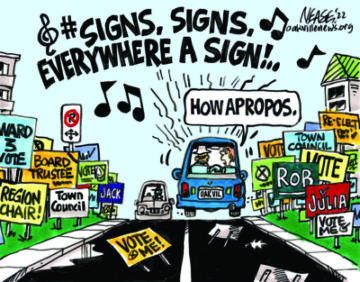by Marie Snyder
I’m running for an elected position: school board trustee. It’s a relatively minor position and non-partisan, so there’s no budget or staff. There’s also no speeches or debates, just lawn signs and fliers. Campaigning is like an expensive two-month long job interview that requires a daily walking and stairs regimen that goes on for hours. Recently, some well-meaning friends who are trying to help me win (by heeding the noise of the loudest voices) cautioned me to limit any writing or posting about Covid. It turns people off and will cost me votes. I agreed, but then had second thoughts the following day, and tweeted this:
trustee. It’s a relatively minor position and non-partisan, so there’s no budget or staff. There’s also no speeches or debates, just lawn signs and fliers. Campaigning is like an expensive two-month long job interview that requires a daily walking and stairs regimen that goes on for hours. Recently, some well-meaning friends who are trying to help me win (by heeding the noise of the loudest voices) cautioned me to limit any writing or posting about Covid. It turns people off and will cost me votes. I agreed, but then had second thoughts the following day, and tweeted this:
I’ve been cautioned not to tweet so much about covid because it could cost me votes. But we’re sleepwalking through a crisis that could be averted if we can just open our eyes to it. Hospitalizations and deaths are way higher now than this time in the previous two years.
Protecting kids by possibly saying that one thing that finally lights a fire under chairs to #BringBackMasks is far more important to me than winning a popular vote. Look at young people dropping dead from strokes! The pandemic didn’t end. We’re not easing out of it. We’re in the thick of it. But it appears that some people in power want you at work and going to restaurants and bars and travelling more than they care to prevent children getting sick and hospitals overflowing.
There are variants that bypass vaccines. A well-fitting N95 can stop all variants. And CR boxes filter all variants. If we #BringBackMasks then more of us stand a fighting chance at avoiding getting this repeatedly, accumulating risk factors for brain damage or strokes. Masks don’t stop us from living; Covid does.
I closed my laptop to avoid reading the expected onslaught from haters, but, once I mustered the courage to look, found incredible support instead. Hundreds of new people followed me, and my email was suddenly full of donations and requests for signs. That one tweet appeared to do more than weeks of walking door to door. Read more »



 Upton Sinclair famously remarked that “it is difficult to get a man to understand something when his salary depends on his not understanding it.” It is easy to imagine the sort of scenario that illustrates his point. A drug company rep works to increase how often a certain drug is prescribed, putting aside any worries that it is addictive. A video game designer seeks to increase the number of hours young players spend hooked on a game, not thinking about the impact this might have on their education.
Upton Sinclair famously remarked that “it is difficult to get a man to understand something when his salary depends on his not understanding it.” It is easy to imagine the sort of scenario that illustrates his point. A drug company rep works to increase how often a certain drug is prescribed, putting aside any worries that it is addictive. A video game designer seeks to increase the number of hours young players spend hooked on a game, not thinking about the impact this might have on their education.